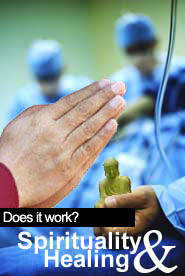Prayer 'no aid to heart patients'
BBC, July 15, 2005
London, UK -- Praying for patients undergoing heart operations does not improve their outcomes, a US study suggests. A study found those who were prayed for were as likely to have a setback in hospital, be re-admitted, or die within six months as those not prayed for.
 The Duke University Medical Center study of 700 patients, in the Lancet, said music, image and touch therapy did appear to reduce patients' distress.
The Duke University Medical Center study of 700 patients, in the Lancet, said music, image and touch therapy did appear to reduce patients' distress.
Heart experts said patients could benefit from feeling more optimistic.
Further evidence is emerging that people with a more positive outlook appear to be less affected by stressful events, such as having surgery
Dr Charmaine Griffiths, British Heart Foundation
Therapies such as prayer and homeopathy are widely used, although past studies looking at the impact of care on patients' health have had mixed results.
This study looked at 700 patients undergoing angiograms (an X-ray of the blood vessels) or other heart operations at nine hospitals across the US.
Christian, Muslim, Jewish and Buddhist prayer groups were assigned to pray for 371 of the patients. The rest had no prayer group.
In addition, 374 of the patients were assigned MIT therapy and the rest none.
MIT involved teaching the patients relaxed breathing techniques and playing them easy listening, classical, or country music during their procedure.
The researchers found that neither therapy alone, or combined, showed any measurable treatment effect on serious cardiovascular events, hospital readmission or death.
But those given music, imagery and touch therapy had less emotional distress and had a lower death rate after six months, though this was not seen as statistically significant.
'Proper subjects'
Dr Mitchell Krucoff, who led the study, said: "If we want to understand the role of human capacities and resources in the midst of our most advanced medical technologies, we have to do good science.
"With no notion of the actual mechanisms involved in ancient healing practices such as prayer or touch or music, structured outcomes research allows us to collect data that we can learn from in many ways."
A Lancet editorial on the paper said it would be premature to rule out the use of such therapies in modern medicine.
It added: "The contribution that hope and belief make to a personal understanding of illness cannot be dismissed so lightly.
"They are proper subjects for science, even while transcending its known bounds."
Dr Charmaine Griffiths, spokesperson for the British Heart Foundation, said: "While this research suggests that prayer and alternative therapies do not improve the clinical outcome for patients undergoing heart procedures, there is increasing interest in the possibility that positive emotional states are beneficial to heart health."
She said associations had been seen between positive emotional states and low levels of the stress hormone cortisol.
"Further evidence is emerging that people with a more positive outlook appear to be less affected by stressful events, such as having surgery."
She added: "Patients learning to relax by using breathing techniques and listening to music, and being aware that others are thinking of them may contribute to a more optimistic outlook.
"Whether these effects are significant remains unproven."

 The Duke University Medical Center study of 700 patients, in the Lancet, said music, image and touch therapy did appear to reduce patients' distress.
The Duke University Medical Center study of 700 patients, in the Lancet, said music, image and touch therapy did appear to reduce patients' distress.